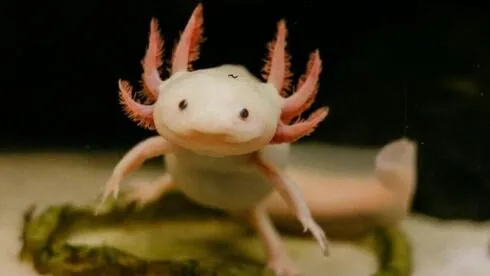
Meet the Axolotl: Nature's Timeless Wonder That Defies Aging
2025-06-02
Author: Ken Lee
The Ageless Marvel of the Animal Kingdom
In a world where aging is an undeniable truth for most creatures, one amphibian defies the odds: the axolotl (Ambystoma mexicanum). This extraordinary salamander showcases a phenomenon known as negligible senescence, where the aging process seems almost to vanish.
Traits That Set the Axolotl Apart
The axolotl is not just any amphibian—its remarkable abilities make it a biological wonder. Renowned for its regenerative prowess, this unique creature can regenerate not just limbs, but also crucial organs like the heart, lungs, and even parts of its eyes. Its exceptional resistance to cancer and a slower accumulation of senescent cells—cells that linger in the body and contribute to aging—further underline its status as a potential biological fountain of youth.
Unlocking the Secrets of Slowed Aging
With a lifespan typically ranging from 10 to 13 years in captivity, the axolotl has become a prime subject for researchers eager to unravel the mysteries of aging. A recent study, yet to be peer-reviewed, sheds light on the molecular dynamics behind its prolonged youthfulness.
The Epigenetic Clock: Key to the Axolotl's Longevity?
One of the notable molecular markers associated with aging is DNA methylation, a process involving the addition of methyl groups to DNA without altering its sequence. This process significantly influences which genes are activated or suppressed as an organism grows older. However, in axolotls, methylation levels remain surprisingly stable throughout their lives.
Stunning Findings: Aging Stalls After Four Years
Researchers have conducted a deep dive into the DNA methylation of axolotls across a span of ages, from just four weeks to 21 years. Their findings were nothing short of astonishing. Unlike mammals, where DNA methylation increases with age, axolotls experience no significant molecular shifts after the first four years of life—an indicator that their aging may effectively stall. According to researcher Maximina H. Yun, this potential proof of negligible aging is a groundbreaking insight, although the cause of death in axolotls remains an enigma.
The Future of Aging Research: Inspired by the Axolotl
As scientists continue to study the axolotl, the implications could reshape our understanding of aging and potential therapies for age-related diseases. The charming axolotl not only captures hearts but may hold the secrets to extending longevity, challenging everything we know about life’s timeline.



 Brasil (PT)
Brasil (PT)
 Canada (EN)
Canada (EN)
 Chile (ES)
Chile (ES)
 Česko (CS)
Česko (CS)
 대한민국 (KO)
대한민국 (KO)
 España (ES)
España (ES)
 France (FR)
France (FR)
 Hong Kong (EN)
Hong Kong (EN)
 Italia (IT)
Italia (IT)
 日本 (JA)
日本 (JA)
 Magyarország (HU)
Magyarország (HU)
 Norge (NO)
Norge (NO)
 Polska (PL)
Polska (PL)
 Schweiz (DE)
Schweiz (DE)
 Singapore (EN)
Singapore (EN)
 Sverige (SV)
Sverige (SV)
 Suomi (FI)
Suomi (FI)
 Türkiye (TR)
Türkiye (TR)
 الإمارات العربية المتحدة (AR)
الإمارات العربية المتحدة (AR)